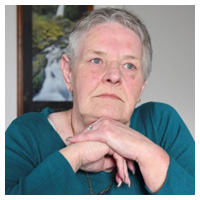Kath Donaldson
Kath lives in Victoria and apart from being part of our frontline contact team she is an Australian Liaison for the GBS|CIDP Foundation International.
What is your role on the Committee and what does it entail?
I assist Trish fielding phone calls from newly diagnosed patients, families, caregivers.
Can you briefly share your GBS/CIDP experience?
I was diagnosed with GBS in August 2011. I was fortunate that my diagnosis was quick thanks to an amazing young Israeli Neurologist. When I look back now, the symptoms started a couple of weeks prior to becoming quite intense. I was admitted to St. Vincent’s Hospital in Melbourne on a Tuesday evening after spending around 11-12 hours in the ER. IVIG treatment commenced the next morning and while it’s not a cure, it did stop my symptoms from exacerbating.
After the 5 day loading dose I asked my treating doctors what was next … when they told me that there wasn’t anything more they could do, I begged and pleaded with the treating Neuro to let me go home as I felt I was taking up bed space that someone more unwell may need. He begrudgingly discharged me on the proviso that if my symptoms deteriorated, I was to present back at the E.R. immediately. Of course, I promised I’d do that. In hindsight I should have stayed, but my stubborn streak won out. I did do outpatient rehab however and when that plateaued, I just continued on my own.
What was the toughest challenge you faced during your recovery?
My toughest challenge was me getting my head to accept what had happened and that it wasn’t the result of something I had done. Then I had to try and move forward from that. With the help of my amazing family doctor and a psychiatrist, they were paramount in my psychological recovery from the diagnosis. Without them I don’t know where I’d be because I went to a very dark place.
Even though I’m now 11 years post diagnosis, I still have deficits, numbness, tingling, pins & needles, electric shock type feelings, balance issues etc., but life goes on and while the deficits are still there, they don’t rule my life. GBS chose me to slam into, so it needs to learn that it plays by my rules, sometimes that works to my detriment because even now, if I overdo things, it lets me know in no uncertain terms that it thinks it’s the boss. We have a constant tussle going on, sometimes I win and sometimes I don’t, but it’s never dull.
Has your GBS/CIDP journey changed your life in any way?
GBS has changed my life significantly. I had to medically retire at 58, I used to work for a transport company in admin and I could no longer do the job they employed me to do. That sent me looking for volunteer roles where I have the opportunity to speak to newly diagnosed patients and help them to see that there is light at the end of the tunnel. I am also a volunteer Liaison for the US based GBS-CIDP Foundation International, a role I’ve been doing since 2014 and I’ve been volunteering for the GBS Association of New South Wales for a couple of years now, as well as running social media support groups for patients and their families since 2012, and that keeps me quite busy.
What inspires you everyday?
I’m inspired by the courage and strengths that I see in other patients who have been diagnosed with GBS or CIDP or any variants, and I’m inspired by my fellow Committee members with the NSW Association. I’m honoured to be a small part of their organisation as well as the International Foundation.
Do you have anything else you would like to share?
I look forward to continuing my volunteering and broadening my knowledge of these rare illnesses and of course, helping others to find their way through the storm that is our diagnosis.
